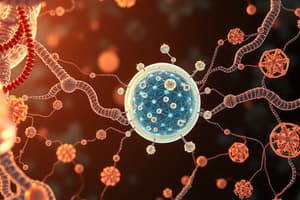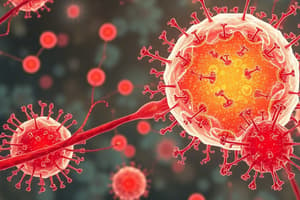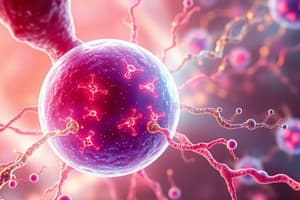Podcast
Questions and Answers
What is the first signal for B cell activation?
What is the first signal for B cell activation?
- Activation of helper T cells
- Inside-out signaling by Syk
- Binding of antigen to the BCR (correct)
- Cell proliferation and differentiation
What is the kinase necessary for the rearrangement of receptors on the B cell surface?
What is the kinase necessary for the rearrangement of receptors on the B cell surface?
- Helper T cells
- Syk (correct)
- BCR
- Antigen
What process triggers B cell activation?
What process triggers B cell activation?
- Binding of specific antigens to the B cell receptor (correct)
- Antigen production by helper T cells
- Cell differentiation
- Syk signaling
What is essential for the activation of various signaling pathways within the B cell?
What is essential for the activation of various signaling pathways within the B cell?
What leads to the rearrangement of receptors on the B cell surface?
What leads to the rearrangement of receptors on the B cell surface?
Which interaction is crucial for the end result of the B cell activation process?
Which interaction is crucial for the end result of the B cell activation process?
What is the first phase of B cell activation known as?
What is the first phase of B cell activation known as?
What is the role of helper T cells in the B cell activation process?
What is the role of helper T cells in the B cell activation process?
What initiates the BCR signaling pathway?
What initiates the BCR signaling pathway?
What is the main outcome of B cell activation?
What is the main outcome of B cell activation?
Which signaling pathways are involved in the activation and proliferation of B cells?
Which signaling pathways are involved in the activation and proliferation of B cells?
What do helper T cells provide for B cell proliferation and differentiation?
What do helper T cells provide for B cell proliferation and differentiation?
What is essential for the initial triggering of the BCR?
What is essential for the initial triggering of the BCR?
What provides signals that promote B cell activation, proliferation, and differentiation?
What provides signals that promote B cell activation, proliferation, and differentiation?
What does B cell signal transduction provide valuable insights into?
What does B cell signal transduction provide valuable insights into?
What does the upregulation of surface molecules involve?
What does the upregulation of surface molecules involve?
What is the salvage pathway essential for?
What is the salvage pathway essential for?
Which enzymes are involved in the activation of B cells through the B cell receptor (BCR)?
Which enzymes are involved in the activation of B cells through the B cell receptor (BCR)?
What are B1 B cells known for?
What are B1 B cells known for?
What role does the activation of B cells play in immune responses?
What role does the activation of B cells play in immune responses?
What is triggered through the B cell receptor (BCR) during activation?
What is triggered through the B cell receptor (BCR) during activation?
What does the salvage pathway help to maintain during B cell activation?
What does the salvage pathway help to maintain during B cell activation?
Which enzyme is considered a rate-limiting enzyme in deoxyribonucleoside salvage?
Which enzyme is considered a rate-limiting enzyme in deoxyribonucleoside salvage?
Which enzyme catalyzes the reversible phosphorolysis of nucleosides to generate purines?
Which enzyme catalyzes the reversible phosphorolysis of nucleosides to generate purines?
Which pathway supports the production of various cytokines and the overall function of B1 B cells?
Which pathway supports the production of various cytokines and the overall function of B1 B cells?
What is the role of the salvage pathway in maintaining cellular energy and nucleotide balance?
What is the role of the salvage pathway in maintaining cellular energy and nucleotide balance?
Which enzyme is involved in converting hypoxanthine and guanine into their respective nucleotides?
Which enzyme is involved in converting hypoxanthine and guanine into their respective nucleotides?
In which conditions does the salvage pathway play a crucial role in maintaining cellular energy and nucleotide balance?
In which conditions does the salvage pathway play a crucial role in maintaining cellular energy and nucleotide balance?
What is the significance of the salvage pathway in supporting the immune system's response to various challenges?
What is the significance of the salvage pathway in supporting the immune system's response to various challenges?
What is the primary function of Purine nucleoside phosphorylase (PNP) in the salvage pathway?
What is the primary function of Purine nucleoside phosphorylase (PNP) in the salvage pathway?
What impact does a deficiency in Deoxycytidine kinase (DCK) have on murine lymphocyte development?
What impact does a deficiency in Deoxycytidine kinase (DCK) have on murine lymphocyte development?
What type of cells are known for their regulatory functions in the immune system and are believed to be influenced by the salvage pathway?
What type of cells are known for their regulatory functions in the immune system and are believed to be influenced by the salvage pathway?
Flashcards are hidden until you start studying
Study Notes
B Cell Signal Transduction: A Comprehensive Overview
B cell signal transduction is a complex process that plays a crucial role in the immune response. It involves the activation of B cells by specific antigens, which leads to cell proliferation, differentiation, and the production of antibodies. This article will focus on the key aspects of B cell activation and signal transduction.
B Cell Activation
B cell activation is triggered by the binding of specific antigens to the B cell receptor (BCR). This process depends on the characteristics of the antigen and the state of the B cell. The end result of this process will depend on the interactions between the B cell, the antigen, and other cells in the immune system, such as helper T cells.
The activation process involves several steps:
-
Binding of antigen to the BCR: The first signal for B cell activation is generated by BCR cross-linking with antigen. This interaction leads to the activation of various signaling pathways within the B cell.
-
Inside-out signaling by Syk: The kinase Syk is necessary for the rearrangement of receptors on the B cell surface, which is essential for B cell activation. Syk binds to the signaling motif within the BCR, causing the receptors to change shape and allowing the parts outside the cell to move apart. This process, known as inside-out signaling, is the first phase of B cell activation.
-
Upregulation of surface molecules and antigen processing: Activation involves the upregulation of surface molecules, antigen internalization processing, and presentation as MHC molecules, especially in the case of protein-containing antigens.
-
Proliferation and differentiation: B cell activation leads to cell proliferation and differentiation, generating a population of antibody-secreting cells.
Signaling Pathways in B Cell Receptor
The BCR signaling pathway is initiated when the mIg subunits of the BCR bind a specific antigen. The initial triggering of the BCR is similar for all receptors of the non-catalytic tyrosine kinase (TK) family. Several signaling pathways are involved in the activation and proliferation of B cells, including the phosphoinositide 3-kinase (PI3K) pathway, the mitogen-activated protein kinase (MAPK) pathway, and the nuclear factor of activated T cells (NFAT) pathway.
Role of Helper T Cells
The interaction between B cells and helper T cells is crucial for the immune response. Helper T cells provide signals and cytokines that promote B cell activation, proliferation, and differentiation. The costimulatory and cytokine requirements for B cell proliferation and differentiation are influenced by the properties of the BCR, the antigen, and helper T cells.
Conclusion
B cell signal transduction is a complex process that is essential for the immune system's ability to respond to antigens and produce antibodies. The activation of B cells involves the interaction of the BCR with specific antigens, leading to inside-out signaling by Syk, upregulation of surface molecules, antigen processing, and the involvement of helper T cells. Understanding the intricacies of B cell signaling transduction can provide valuable insights into the functioning of the immune system and may have implications for the treatment of various diseases.
Studying That Suits You
Use AI to generate personalized quizzes and flashcards to suit your learning preferences.





